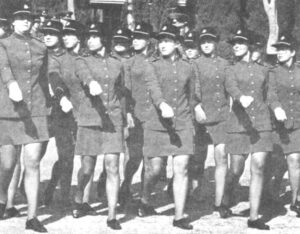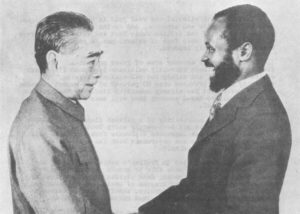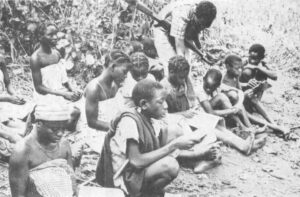Robin Wright
- 1975

Fellowship Title:
- The Dismantling of Portugal's African Empire
Fellowship Year:
- 1975

Women on the March
The Rhodesian political situation is in limbo now more than ever since the government of Prime Minister Ian Smith declared unilateral independence a decade ago. External forces in both black and white African countries are pressuring vehemently for a peaceful settlement between the white government and the black nationalists. Yet the Prime Minister continues to declare that “black majority rule will never come to Rhodesia.” Complicating the picture is the factionalized black nationalist movement, the African National Council (ANC). One side seems willing to compromise, another determined to escalate the guerrilla war on Rhodesia’s northeast border. Although the ANC and Mr. Smith met recently to attempt a peaceful settlement, both sides also continue to escalate the recruitment and training of troops. One of the most notable developments is the establishment of a women’s unit in the Rhodesian army and air force. Robin Wright recently interviewed several of the new enlistees on the eve of their induction in Salisbury and went with them for the first morning of training. Their views, which follow, reflect the hardening

Alan Paton: “The Long View”
Dr. Alan Paton, noted author, columnist and politician, has been a leading advocate of change in South Africa’s racial laws for 50 years, perhaps the longest and loudest voice of opposition throughout that volatile period. Although this is an era heralded for detente and a softening of government policy in South Africa, Dr. Paton’s analysis offers a slightly different perspective. Robin Wright recently visited the septuagenarian author at his home in Kloof, talked with him about the issues of the day, drove with him through the Valley of One Thousand Hills surrounding his home, toured the little Zulu church he helped build, witnessed his involvement as advisor to local Africans, and learned the depth of his feeling for his country, his people and his government. Wright’s assessment is recorded in the following report. Kloof, South Africa The setting was Natal’s Valley of One Thousand Hills, in daylight a maze of fertile serenity, at dusk a mirage-like entanglement of overlapping shadows. Restful yet intense with the wealth of rich earth and haunting power, it is

Independent Mozambique: Behind the Rhetoric, the Program is Pragmatic
The waiting and speculation is over. The southeast African nation of Mozambique, under colonial rule almost 500 years, became independent on June 25. The new government is now able to act on its platforms and promises. During its 13 years of political development and the nine months of transition, Frelimo (Front for the Liberation of Mozambique) came out with some bold talk that frightened its “white” neighboring nations. Rumors were rampant in the pre-independence period about the actions the party would take to change the political picture in southern Africa. But theory does not always become reality, not immediately anyway, as Robin Wright points out in the following assessment of policies in the newly-declared People’s Republic of Mozambique. Wright spent almost four months in the former Portuguese colony, talked with all the key leaders and stayed after Independence to assess the celebration rhetoric. Lourenco Marques, Mozambique The statues to Portuguese heroes have been torn down and carted to a city junkyard. The complicated new red-green-yellow-black-white flag now flies proudly from new poles on every

The Art of Independence
Independence for a country like Mozambique, which was under colonial rule for almost 500 years, is not just a political event. Freedom also “liberates the soul and the spirit of the people,” as one Mozambican put it. Those who best express this new spirit are usually the artists and writers, as Robin Wright discovered during conversations with several artists in Lourenco Marques. Wright has been investigating the impact of independence in Mozambique on the human level as well as the political situation. What follows is the story of one young man, his experiences during the colonial period and the difference in his work since his southeast African country moved toward independence. Lourenco Marques, Mozambique Fernando Sumbana has no easel or palate. He has never had an art teacher or professional guidance since his school did not offer even finger painting. He has seen but one piece of art from outside his country — a copy of a Picasso; Rembrandt, Vermeer, El Greco, Monet are but foreign names to him. Canvas is unavailable and brushes

Alphabetization: Key to Literacy and Political Awareness in Mozambique
One of the greatest obstacles to national development throughout sub-Sahara Africa is illiteracy. Low levels of education prevent contact between government and the masses, the transmission of better techniques for agriculture and production, and realization of national goals and priorities. Upon independence on June 25, Mozambique’s population was 80 percent illiterate. But a radical program to educate the nine million population of this southeast African country is already making a dent in this figure, and at the same time rallying support for the new government. Robin Wright has been in Mozambique for three months investigating changes made during the transition period. What follows is Wright’s assessment of the Alphabetization program and its impact on the people — and future — of Mozambique. Lourenco Marques, Mozambique The teacher authoritatively pointed to letters on the worn blackboard with the end of an equally worn broom. In unison the students obediently repeated the sequence of one syllable words using the letter a. then the letter p. “Yes,” he said approvingly in Portuguese. “That’s good, let’s try it
